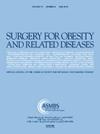肾移植受者减肥手术后的癌症发病率:一项回顾性多中心
IF 3.5
3区 医学
Q1 SURGERY
引用次数: 0
摘要
背景:肥胖是恶性肿瘤发生的独立危险因素。此外,肾移植受者(RTR)的总体恶性肿瘤风险增加2- 4倍,每年的绝对风险超过0.7%。虽然移植受者有肥胖和恶性肿瘤的风险,但减肥手术(BS)在移植后环境中的效果尚不清楚。目的:本研究主要评估BS对移植后重度肥胖RTR患者癌症发病率的影响。其次分析减肥结果。SettingUniversity医院。方法采用TriNetX数据库进行回顾性研究,分析2000年至2023年伴有移植后BS的RTR与不伴有BS的RTR的癌症结局。在排除过程和倾向匹配之后,两个队列包括153名患者。结果rtr - bs患者总体癌症和移植相关癌症的发生率显著降低(P <;. 05)。在皮肤癌、胃肠道癌和生殖癌中没有发现显著差异。5年时,仅rtr组的超重减重率(%EWL)显著低于RTR-BS组(57.8%)(11.4%)。袖胃切除术(SG)患者3年EWL(73.19%)明显高于Roux en-Y胃旁路(RYGB)患者(49.33%)。SG和RYGB患者的癌症发病率没有差异。结论肾移植后BS对重度肥胖RTR患者总体及移植相关癌症发病率的影响减弱。肾移植后BS患者体重明显减轻。本文章由计算机程序翻译,如有差异,请以英文原文为准。
Cancer incidence following bariatric surgery in renal transplant recipients: a retrospective multi-center analysis
Background
Obesity, a known independent risk factor for developing malignancy. Additionally, renal transplant recipients (RTR) confer a 2- to 4-fold increased risk of overall malignancies with an excess absolute risk of .7% per year. While transplant recipients are at risk for obesity and malignancy, the effect of bariatric surgery (BS) in the posttransplantation setting is not well known.
Objectives
Our study primarily evaluated the impact of BS on cancer incidence in RTR with severe obesity in the posttransplantation setting. Weight loss outcomes were analyzed secondarily.
Setting
University Hospital.
Methods
A retrospective study using TriNetX database was developed to analyze cancer outcomes in RTR with posttransplantation BS versus RTR without BS from 2000 to 2023. After the exclusion process and propensity matching, both cohorts consisted of 153 patients.
Results
RTR-BS had a significantly lower incidence of overall cancer and transplant-related cancers (P < .05). No significant difference was identified in cutaneous, gastrointestinal, and reproductive cancers. Percent Excess Weight Loss (%EWL) was significantly lower in RTR-only cohort (11.4%) versus RTR-BS cohort (57.8%) at 5 years. Sleeve gastrectomy (SG) patients (73.19%) had significantly higher %EWL than Roux en-Y gastric bypass (RYGB) patients (49.33%) at 3 years. No difference in cancer incidence was noted between SG and RYGB patients.
Conclusion
Postrenal transplantation BS had a diminishing effect on overall and transplant-related cancer incidence in RTR with severe obesity. Significant weight loss was also demonstrated with post-renal transplantation BS.
求助全文
通过发布文献求助,成功后即可免费获取论文全文。
去求助
来源期刊
CiteScore
6.70
自引率
12.90%
发文量
570
审稿时长
56 days
期刊介绍:
Surgery for Obesity and Related Diseases (SOARD), The Official Journal of the American Society for Metabolic and Bariatric Surgery (ASMBS) and the Brazilian Society for Bariatric Surgery, is an international journal devoted to the publication of peer-reviewed manuscripts of the highest quality with objective data regarding techniques for the treatment of severe obesity. Articles document the effects of surgically induced weight loss on obesity physiological, psychiatric and social co-morbidities.

 求助内容:
求助内容: 应助结果提醒方式:
应助结果提醒方式:


